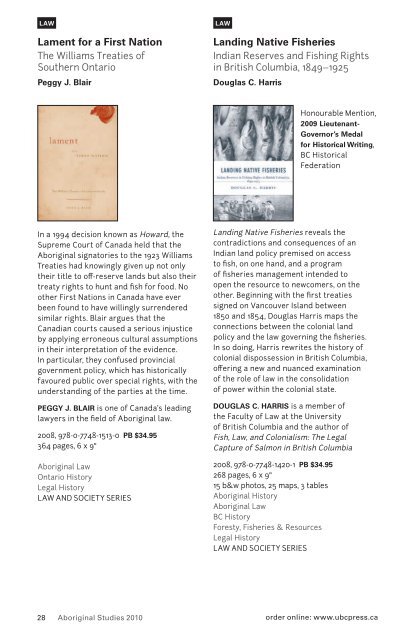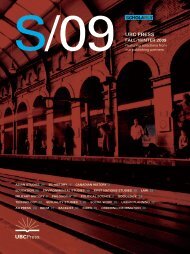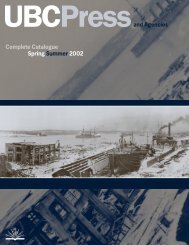Aboriginal Studies - UBC Press - University of British Columbia
Aboriginal Studies - UBC Press - University of British Columbia
Aboriginal Studies - UBC Press - University of British Columbia
Create successful ePaper yourself
Turn your PDF publications into a flip-book with our unique Google optimized e-Paper software.
law law<br />
lament for a first nation<br />
The Williams Treaties <strong>of</strong><br />
Southern Ontario<br />
peggy J. blair<br />
In a 1994 decision known as Howard, the<br />
Supreme Court <strong>of</strong> Canada held that the<br />
<strong>Aboriginal</strong> signatories to the 1923 Williams<br />
Treaties had knowingly given up not only<br />
their title to <strong>of</strong>f-reserve lands but also their<br />
treaty rights to hunt and fish for food. No<br />
other First Nations in Canada have ever<br />
been found to have willingly surrendered<br />
similar rights. Blair argues that the<br />
Canadian courts caused a serious injustice<br />
by applying erroneous cultural assumptions<br />
in their interpretation <strong>of</strong> the evidence.<br />
In particular, they confused provincial<br />
government policy, which has historically<br />
favoured public over special rights, with the<br />
understanding <strong>of</strong> the parties at the time.<br />
peggy J. blair is one <strong>of</strong> Canada’s leading<br />
lawyers in the field <strong>of</strong> <strong>Aboriginal</strong> law.<br />
2008, 978-0-7748-1513-0 pb $34.95<br />
364 pages, 6 x 9"<br />
<strong>Aboriginal</strong> Law<br />
Ontario History<br />
Legal History<br />
LAW AND SOCIETY SERIES<br />
landing native fisheries<br />
Indian Reserves and Fishing Rights<br />
in <strong>British</strong> <strong>Columbia</strong>, 1849–1925<br />
douglas c. Harris<br />
Honourable Mention,<br />
2009 lieutenantgovernor’s<br />
medal<br />
for Historical writing,<br />
BC Historical<br />
Federation<br />
Landing Native Fisheries reveals the<br />
contradictions and consequences <strong>of</strong> an<br />
Indian land policy premised on access<br />
to fish, on one hand, and a program<br />
<strong>of</strong> fisheries management intended to<br />
open the resource to newcomers, on the<br />
other. Beginning with the first treaties<br />
signed on Vancouver Island between<br />
1850 and 1854, Douglas Harris maps the<br />
connections between the colonial land<br />
policy and the law governing the fisheries.<br />
In so doing, Harris rewrites the history <strong>of</strong><br />
colonial dispossession in <strong>British</strong> <strong>Columbia</strong>,<br />
<strong>of</strong>fering a new and nuanced examination<br />
<strong>of</strong> the role <strong>of</strong> law in the consolidation<br />
<strong>of</strong> power within the colonial state.<br />
douglas c. Harris is a member <strong>of</strong><br />
the Faculty <strong>of</strong> Law at the <strong>University</strong><br />
<strong>of</strong> <strong>British</strong> <strong>Columbia</strong> and the author <strong>of</strong><br />
Fish, Law, and Colonialism: The Legal<br />
Capture <strong>of</strong> Salmon in <strong>British</strong> <strong>Columbia</strong><br />
2008, 978-0-7748-1420-1 pb $34.95<br />
268 pages, 6 x 9"<br />
15 b&w photos, 25 maps, 3 tables<br />
<strong>Aboriginal</strong> History<br />
<strong>Aboriginal</strong> Law<br />
BC History<br />
Foresty, Fisheries & Resources<br />
Legal History<br />
LAW AND SOCIETY SERIES<br />
28 <strong>Aboriginal</strong> <strong>Studies</strong> 2010 order online: www.ubcpress.ca






